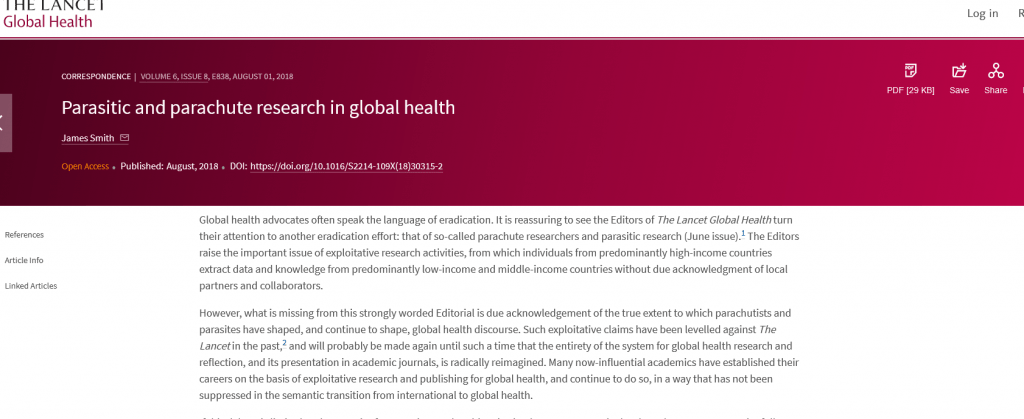
Thanks to Peter Williams for this piece in Nature Career Column to add to our collection of “similarities between less-developed countries and less developed parts of more-developed countries.”
The practice of scientists from wealthy nations visiting lower-income countries, collecting samples, publishing the results with little or no involvement from local scientists, and providing no benefit for the local community is referred to as neo-colonial, helicopter or parachute research1. T
From these experiences, I have made my own set of rules to follow to form meaningful collaborations and avoid helicopter research:
1. When you start a project in a new location, take the time to learn who is working or living at the site. These people could be an Indigenous group or scientists from another university, government agency or non-governmental organization. Contact them before you start your project and invite them to a meeting to introduce yourself.
2. In the field, take the time to meet as many people as you can, even if it’s just for coffee. Discover what you have in common. Maybe they have long-term data they want to share or they can provide advice for choosing one field site over another one.
3. Offer to collaborate and provide something in exchange, such as information, sample analysis, and, later, co-authorship.
4. Involve everyone throughout the process. Share your data and ask for advice and feedback as soon as you get some results. Don’t wait for the project to be finalized or the paper to be published. Send a report of your results, even if it’s just a graph and some pictures.
5. If they agree to collaborate, recognize the input that they have already had. Perhaps without you noticing, they could have improved your sampling design (by helping you choose your field sites) or helped with data collection (by taking you to a location or helping you to arrange entrance to a farm or a protected area, for example). And their local knowledge will be extremely valuable for interpreting the results.
An immediate solution to stop helicopter research is to recognize that knowledge comes in many forms, and diversity of understanding improves research. As a field scientist who works in many locations around the world, my knowledge of the natural world is limited to what I can gather on my relatively short field trips.
Without the knowledge of local people and their traditional culture that can span thousands of years, my conclusions could be misinformed or simply wrong. I have learnt that working with local people is not about charity, but about respecting the knowledge that does not follow the conventional rules of colonial science. Importantly, it is about ensuring research has an impact on and is valuable to the places we are lucky enough to study.
I’d only add to “who is working” perhaps federal and state professional resource specialists; who might not call themselves “scientists” but still know many things. And folks from any collaboratives in the area and…. I wish this approach were encouraged in researcher training.. perhaps it is today. Maybe all federal agencies could require evidence of this in their grant programs?